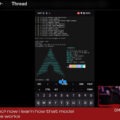Rocky Linux plans to fill a CentOS sized void, Fedora 34 goes full PipeWire, OBS 26.1 adds support for virtual cams, and project Croissant brings Chrome OS to any laptop.
Listen:
Download:
Subscribe Spotify | Pandora | TuneIn | RSS | More
Timestamps:
00:00 Intro
04:56 Rocky Linux
11:01 Kernel 5.10
16:06 Gnome Oct Nov updates
20:46 PipeWire for Fedora 34
23:31 OBS Studio 26.1
28:06 OBS Jack fix
35:31 Chromefy
42:26 iQaudio HiFi Pie hats
46:46 Emails
- Rocky Linux is an upcoming Linux distribution that is currently in development. It is intended to be a downstream, complete binary-compatible release using the Red Hat Enterprise Linux (RHEL) operating system source code.
- The project’s aim is to provide a community-supported, production-grade enterprise operating system.
- Named after the CentOS co-founder Rocky McGough.
- CloudLinux is doing their own thing as well.
- Oracle even tried to get in on the action.
- As we talked about in January, Huawei offers a CentOS based enterprise Linux distribution called EulerOS as well.
- Huawei also has released a community edition of EulerOS called openEuler.
- I would steer clear of both Huawei and Oracle when it comes to your low budget enterprise needs.
- Rocky may very well turn out to be the distro you’re looking for in that instance.
- Linus Torvalds just released Linux Kernel 5.10, the latest ‘Long Term Support’ Linux Kernel, with major updates and improvements.
- Support for the initial RISC-V boot by EFI.
- More support for AMD RDNA 2 Radeon RX 600 GPUs.
- Supports the Nintendo Switch Joy Cons and Pro controller.
- And Guitar Hero.
- The EXT4 format has a major write performance boost from ‘fast commits’ support, and gains optimised file overwrites in DAX/DIO modes.
- Nothing big to report on the audio front aside from a handful of chipsets gaining support.
- Well, there is support for the SB AE-7 but, meh.
- Betterish support for AMD RDNA 2 and whatever Intel is working on.
- Work continues on USB4.
- Builds with the latest Nvidia Vulkan beta driver.
- Very much looking forward to the ext4 bits, even though I’m pretty sure I won’t notice much of a difference
- There’s some extra fixes in there for Zen 3 and supposed performance improvements.
- Which sound great since I do plan to replace this 3700X with its Zen 3 equivalent or maybe a 5900X if they happen to drop below £399.
- The Flycast Libretro core can now play Dreamcast games.
- New app for health tracking.
- Gnome Circle is a new thing for promoting third party apps.
- Gnome will provide promotion and advertising.
- Contributors quality for foundation membership.
- Rusting all the things.
- Introducing Souk.
- Souk is an up and coming independent Flatpak app store written in GTK4 and Rust.
- And is an easy to use and less clunky alternative to GNOME Software, or the Ubuntu Software/Snap Store in Ubuntu.
- It is made by Felix Hacker and Christoper Davis.
- Felix Hacker is the developer of other great GTK4 apps for Linux, including the Shortwave internet radio player and the Fragments bittorrent app.
- A more modern and simple GUI approach to a Flatpak app store is something that is so needed, especially in GNOME.
- Although I still prefer using the flatpak command line.
- Gnome Games trying to cut in on that Lutris action
- Honestly, if you’re developing an application primarily aimed at GNOME and GTK, you should apply for the Circle.
- Talked about the proposal a few weeks back.
- PipeWire will replace Pulseaudio In the next version of Fedora.
- Desktop users should not notice any changes.
- This will be good for hunting down bugs and edge cases.
- We had talked about that the Fedora developers were aiming for PipeWire to be stable in Fedora 34, so it’s great that they are on track.
- Good timing!
- I get to try piping the wires on the newly i7’ed X240.
- Virtual Camera output on Linux is now a thing.
- You will need the loopback module installed.
- OpenBSD support!
- HLS support and ingests for YouTube.
- Twitch VOD output.
- And the ability to ingest captions with Decklink.
- By the way, nobody with a Blackmagic Decklink card will be able to capture from another PC.
- I filed a bug report two days before release but hey, at least they didn’t insta-close it.
- And if you ever had two or more instances of OBS opened at the same time and things feel a bit sluggish:
- On Linux, OBS will now detect other instances that are currently running and warn the user about running more than one copy at a time.
- After two years of trying to bring attention to this bug and get it fixed.
- Hector Martin stepped in and sorted some of the nasty stuff going on in the OBS audio stack.
- From my testing it appears to work.
- Of course the feefee brigade had to come in at the end of the thread to whinge about someone who literally fixed their problem for them being a bit mean.
- You know, the person who had their issue insta closed.
- Went to Discord to say that there was in fact an issue, and got told it wasn’t.
- The person who went back two years and found the original issue being discussed and the fact that it was known to be a bit iffy.
- And they’re more worried about their feefees.
- Though I am glad @marcan backed up every single one of his claims and slapped their egos a few extra times for good measure.
- Linux bug and pull requests don’t get much attention in OBS land.
- Much needed things like Save device by path #3437 have been open since September.
- Case in point, my Decklink report from two weeks prior.
- That was insta-closed with a comment suggesting I built it incorrectly and I should visit Discord for support.
- No investigation was done, zero.
- It was actually investigated, reopened and fixed later that day.
- My Decklink PC capture bug was reported a day before release but it had Linux in the title.
- 26.1 was shipped the next day and whoops, it affected Windows as well.
- At the end of the day I want to thank the OBS team for their continued efforts.
- But, your community engagement needs work.
- Until then you can find me in the OBS Discord in Linux support helping where I can.
- Chances are you probably own a laptop that’s more powerful than your typical Chromebook.
- This will let you install ChromeOS by modifying a ChromiumOS image with the extra bits Google didn’t open the sauce for.
- Might make for an interesting stream.
- This could be a great way to update an older Chromebook that is no longer receiving official ChromeOS updates.
Slice of Pi
- DAC+, DAC Pro, DigiAMP+ from IQaudio.
- These are not new but I guess they are now in the official supply chain.
- Codec Zero will ship early in the New Year.
- Like the Pi HQ cam, set your expectations accordingly.
- I would like to see ADAT and XLR input options.
- Or at least line level ¼ jacks.
- Still, for $30 it’s something to play around with.
- This is the first time that the Raspberry Pi Foundation have brought third party products into their lineup.
- The IQaudio products have been used heavily for in-store audio streaming, so this acquisition makes sense.
- I was impressed by the IQaudio DigiAMP+, and that it could drive a pair of speakers at up to 35W per channel.
- The new zero DAC hat will only ship in 2021, the rest should be available shortly if not already.
Feedback
- On the topic of keeping your music local vs in the cloud.
- *presses satellite radio button*











